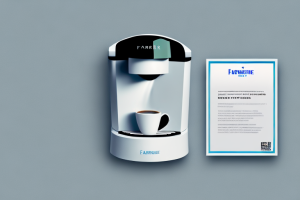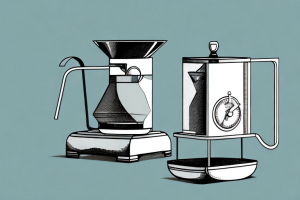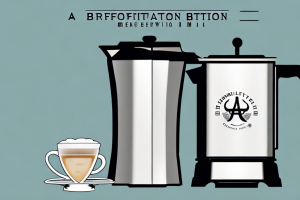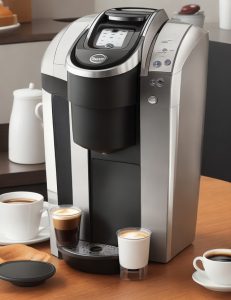Coffee Maker Wattage

A coffee maker with a wattage label visible
For any coffee lover, a coffee maker is an essential appliance in the kitchen. But have you ever noticed that some coffee makers have a higher wattage than others? This may leave you wondering, what is the significance of wattage in coffee makers? In this article, we’ll explore everything you need to know about coffee maker wattage, including how it affects your coffee brewing experience, how to choose the right wattage, the pros and cons of high and low wattage coffee makers, and much more.
Understanding Wattage in Coffee Makers
Wattage is a measure of the rate at which electrical energy is transferred. When it comes to coffee makers, the higher the wattage, the faster the machine can heat up water and brew your coffee. This means that a coffee maker with a higher wattage will typically brew coffee faster than a lower wattage machine. However, higher wattage also means higher energy consumption, which can lead to higher electricity bills.
It’s important to note that wattage isn’t the only factor that affects the brewing time of a coffee maker. Other factors such as the size of the water reservoir, the type of coffee filter used, and the brewing method can also impact the brewing time. For example, a coffee maker with a larger water reservoir may take longer to heat up and brew coffee, even if it has a higher wattage.
When choosing a coffee maker, it’s important to consider your personal preferences and needs. If you’re someone who values speed and convenience, a higher wattage machine may be the best option for you. However, if you’re looking to save on energy costs and don’t mind waiting a bit longer for your coffee, a lower wattage machine may be a better choice.
Wattage and Its Impact on Coffee Brewing
When it comes to the taste and quality of your coffee, wattage can play a role in the brewing process. A high wattage coffee maker can heat up water faster and maintain it at a higher temperature throughout the brewing process. This can lead to stronger coffee that is brewed quickly. However, some coffee connoisseurs argue that slower brewing is better for extracting the full flavor of the coffee beans. In this case, a low wattage coffee maker may be more suitable.
Another factor to consider when it comes to wattage and coffee brewing is the size of the coffee maker. A larger coffee maker with a high wattage may not necessarily brew coffee faster than a smaller coffee maker with a lower wattage. This is because the larger coffee maker may require more time to heat up and distribute the water evenly throughout the brewing process.
It’s also important to note that wattage is not the only factor that affects the taste and quality of your coffee. The type of coffee beans, the grind size, and the water-to-coffee ratio all play a role in the final product. Therefore, it’s important to experiment with different brewing methods and find what works best for your personal taste preferences.
How to Choose the Right Wattage for Your Coffee Maker
When selecting a coffee maker, it’s important to consider how many cups of coffee you need to brew at one time. If you’re brewing for a large family or group of people, a high wattage coffee maker may be necessary to brew coffee quickly and efficiently. However, if you’re only brewing for one or two people, a low wattage coffee maker may be more suitable. It’s also important to consider your energy consumption and eco-friendly choices when selecting a coffee maker wattage.
Another factor to consider when choosing the right wattage for your coffee maker is the type of coffee you prefer. If you enjoy a strong and bold cup of coffee, a high wattage coffee maker may be necessary to extract the full flavor and aroma from the beans. On the other hand, if you prefer a milder and smoother cup of coffee, a low wattage coffee maker may be sufficient. It’s important to experiment with different wattages and brewing methods to find the perfect cup of coffee that suits your taste buds.
The Pros and Cons of High Wattage Coffee Makers
High wattage coffee makers have the advantage of brewing coffee quickly and efficiently. This is especially useful when brewing large quantities of coffee. However, high wattage also means that the coffee maker uses more electricity. This can lead to higher energy bills in the long run. Additionally, some coffee aficionados argue that high wattage machines can produce weaker coffee with less flavor.
On the other hand, some coffee drinkers prefer high wattage coffee makers because they can produce hotter coffee. This is because high wattage machines can heat the water to a higher temperature, which can result in a stronger and more flavorful cup of coffee. However, it is important to note that brewing coffee at a higher temperature can also lead to a bitter taste if not done correctly.
Another factor to consider when choosing a high wattage coffee maker is the durability of the machine. Some high wattage machines may have a shorter lifespan due to the increased strain on the heating elements and other components. It is important to research and choose a reputable brand with a good track record for producing durable and reliable high wattage coffee makers.
Low Wattage vs High Wattage: Which is Better for Your Home?
The answer to this question will depend on your personal preferences and your household’s needs. If you’re looking for an eco-friendly option and don’t mind waiting a little longer for your coffee, a low wattage coffee maker may be a better choice. However, if time is of the essence and you brew coffee frequently for many people, a high wattage coffee maker may be the right choice for you.
Another factor to consider when choosing between low wattage and high wattage appliances is energy efficiency. Low wattage appliances typically use less energy, which can save you money on your electricity bill in the long run. On the other hand, high wattage appliances may be more efficient at completing tasks quickly, which can also save energy by reducing the amount of time the appliance needs to be in use.
It’s also important to note that not all appliances are available in both low and high wattage options. For example, some kitchen appliances like blenders and food processors may only be available in high wattage options due to the power needed to effectively blend or chop ingredients. In these cases, it’s important to weigh the benefits of the appliance against the potential energy usage and cost.
How to Calculate the Energy Consumption of Your Coffee Maker
If you’re concerned about the energy consumption of your coffee maker, it’s fairly easy to calculate. Simply multiply the wattage of your coffee maker by the number of hours you use it per day. This will give you a rough estimate of how much electricity your coffee maker is using on a daily basis. You can then use this information to determine how much you’re spending on electricity and make eco-friendly choices accordingly.
It’s important to note that some coffee makers have a “keep warm” feature that can significantly increase their energy consumption. If your coffee maker has this feature, be sure to factor in the additional wattage and hours of use when calculating its energy consumption. Additionally, consider investing in a coffee maker with an automatic shut-off feature, which will turn off the machine after a certain amount of time to save energy.
The Relationship Between Wattage and Brew Time
As we’ve mentioned, higher wattage coffee makers can brew coffee faster than lower wattage machines. However, the optimal brew time will depend on the type of coffee and the personal preferences of the drinker. For some people, a faster brew time results in a weaker coffee with less flavor. For others, a slower brew time produces a stronger and more flavorful cup of coffee.
It’s important to note that the grind size of the coffee beans can also affect the brew time. Finely ground coffee will require a shorter brew time than coarsely ground coffee. Additionally, the water temperature can impact the brew time and the flavor of the coffee. Water that is too hot can result in a bitter taste, while water that is too cool can produce a weak and under-extracted cup of coffee.
Another factor to consider is the brewing method. For example, a French press typically requires a longer brew time than a drip coffee maker. This is because the coffee grounds are steeped in water for several minutes, rather than passing through a filter quickly. Understanding the relationship between wattage, brew time, and other variables can help you achieve the perfect cup of coffee for your taste preferences.
Tips to Save Energy When Using a High-Wattage Coffee Maker
If you’ve decided on a high wattage coffee maker but still want to reduce your energy consumption, there are a few tips you can follow. First, make sure to turn off the coffee maker once it has finished brewing. Leaving it on can continue to unnecessarily drain electricity. Additionally, using an insulated travel mug instead of leaving the coffee maker on a hot plate can help reduce energy consumption. Finally, consider investing in a programmable coffee maker that can be set to turn on and off at specific times.
Another way to save energy when using a high-wattage coffee maker is to use the right amount of water. Using too much water can cause the coffee maker to work harder and use more energy. Make sure to measure the water accurately and only use the amount needed for the desired number of cups.
It’s also important to clean your coffee maker regularly to ensure it is working efficiently. A dirty coffee maker can cause it to work harder and use more energy. Follow the manufacturer’s instructions for cleaning and descaling your coffee maker to keep it in top condition and reduce energy consumption.
Common Misconceptions About Coffee Maker Wattage
There are several misconceptions about wattage when it comes to coffee makers. For example, some people believe that higher wattage always means better coffee, but this is not necessarily the case. Others believe that high wattage automatically means the coffee maker is more durable, but again, this is not necessarily true. It’s important to research and consider multiple factors when selecting a coffee maker, including wattage, durability, and other features.
How Does Voltage Affect Coffee Maker Wattage?
The voltage of your coffee maker can affect its wattage and performance. In most cases, coffee makers operate on 120 volts, but some machines are designed for 240 volts. If your home or office has a higher voltage electrical system, it may be worthwhile to invest in a coffee maker that can operate on that voltage. However, keep in mind that higher voltage can also lead to higher energy consumption.
Different Types of Coffee Makers and Their Wattages Explained
There are several types of coffee makers on the market, each with its own wattage and brewing method. For example, traditional drip coffee makers typically have a wattage of 600-900 watts, while French press coffee makers have a lower wattage of around 200-400 watts. Espresso machines, on the other hand, have a higher wattage of 800-1,500 watts. When selecting a coffee maker, it’s important to consider not only the wattage but also the type of coffee you enjoy and the brewing method that suits your taste.
Conclusion
In conclusion, coffee maker wattage can have a significant impact on your brewing experience, energy consumption, and even the taste of your coffee. When selecting a coffee maker, it’s important to consider multiple factors, including how many cups you need to brew at one time, your energy consumption, and your personal preferences. High wattage coffee makers can brew coffee quickly and efficiently, but can also lead to higher energy consumption and weaker coffee. Low wattage coffee makers may be a more eco-friendly choice, but may take longer to brew and produce a stronger cup of coffee.



